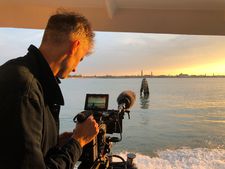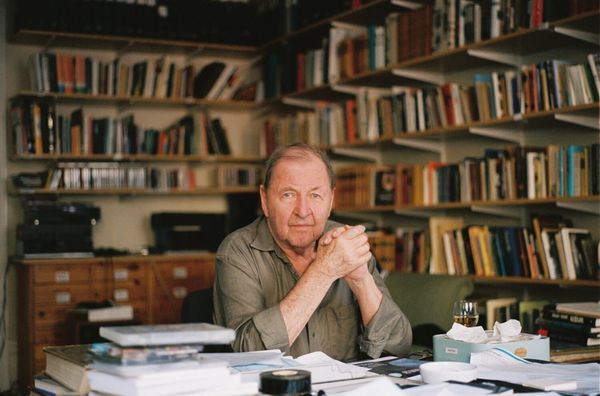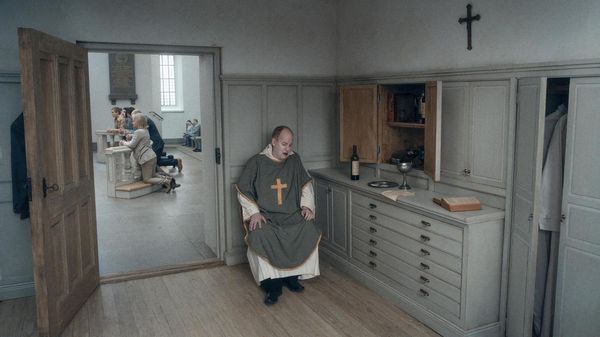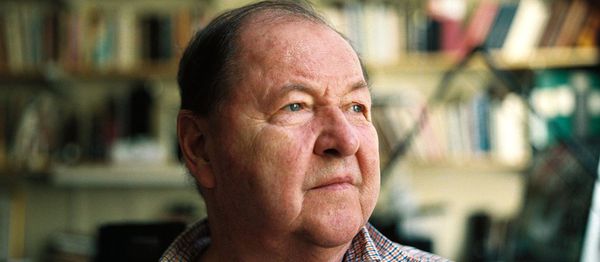The director confined his contributors to those who were coming and going from the studio only, which lends the film a concentrated feel and speaking about the hybrid nature of the end result, Scott said: "My ambition was never to make a sort of process film as such, which might sound like a weird thing to say, given the fact that I've come to a director and asked to make a film during this next piece of art, but generally, trying to swerve those traditional tropes as much as possible."
As the film outlines, Andersson's process is unique, crafting each "scene" of his films within his Stockholm studio -where he also lives - with a team of designers who craft everything from the grass on up. It took the British director about 18 months to get access to the studio, working with Andersson's producer Johan Carlson.
Scott added: "My angle was always to have someone come in objectively and try to tell their story like an outsider in their very, sort of hermetic world.
 |
| Director Fred Scott shooting in Venice the day after About Endlessness had its premiere Photo: Fred Scott |
At the end of 2017, Scott showed them a test film to indicate his approach. He said it was a much more straightforward film about Andersson's process at that point, but added: "Early on, Roy did talk about self-confidence and vulnerability in a very, very open way. And that's when I knew there was something, some depth here. That there was something interesting emotion-wise - that idea of an artist on Roy's level having these sort of creative doubts and personal doubts emboldened me that this was worth pursuing." Given how much control Andersson exerts over his own films, it's surprising how open he is when it comes to talking to Scott. He said: "I did reassure him. I always pitched it to him as like, 'Let me show you that I can frame this sensitively in a documentary'."
"Roy was very trusting," he added, "especially a year and a half in, when we started talking about the alcohol problem."
He says the catalyst was when one production designer quit the studio on a day that Scott happened to be there.
He added: "He quit in quite a sort of angry way. So I knew I knew there was some kind of problem but I didn't know it was like, I didn't understand the legacy of the problem until we were over a year in.
"At that point, he was very just very generous. It was the first time he had really talked about the drinking, I was told by producers, certainly not in that detail. "The editor Michael Aaglund and I didn't include a lot of what he told me. There were many more levels to and the sort of genetic legacy of addiction and his family went much further. It was always about just trying to strike that balance, pointing the problem back to what he was trying to say in the film he was making really letting the art tell the story."
 |
| Fred Scott on entering Roy Andersson's studio: "My angle was always to have someone come in objectively and try to tell their story like an outsider in their very, sort of hermetic world" |
"He was definitely trying to reconcile what level of problem it was. And he was slowly absorbing a sense of it from those around him. Like I think when the production guy quit that first year, I think that would have helped, but there was still an element of denial over that time.
"It was definitely when he went to rehab, which, at that point, I thought he was going to rehab for two months. That's what he had signed up for and that's what everyone around him was excited about that was actually going to go away and convalesce over most of the summer at that point. But he only lasted a week or 10 days or so. But it was only at that point that he really started to see it as an actual problem that needed to be directly addressed. So there was definitely a big level of denial on Roy's part about the severity of the problem."
The unpredictability of Andersson had consequences for Scott's documentary as well, as the schedule of About Endlessness slipped backwards and he found the time he was shooting also being extended. "On a logistical level, it was a very tough project," Scott said. "We never got funding, which was just apocalyptic in terms of how long this went on for. Archers Mark, the production company, were incredible on that front, because I managed to fund it for the first 18 months, and then they came in and pulled so many resources to get it done.
"But it was a hard one to get funding because it's really hard to tell people what was happening because it was so private. So it's hard to explain why this would be different and why it was particularly interesting for someone like Roy and the films he makes.
"There was definitely a sense that the film wouldn't get made at one point, towards the end of 2018. When Roy is at his lowest point, there's an interview with him talking about the film prison or always following him around, etc. From January 2019 to March 2019, he couldn't leave his apartment pretty much. Apart from doctors and physios visiting him, he was largely bedridden that time and very, very ill. So there was definitely a question of whether he was able to come back even though they had two scenes left. "There was talk that, potentially, the film would have to be finished in a different process, almost by a sort of committee, to get the film finished. So it got really, really, really bad. And at that point, I realised it was going to be another year, if you did come back, and another year of production as well. So that was really complicated. But I was in so deep at that point that there was no reversing."
About Endlessness itself was, of course, finally finished - and is streaming on Curzon Home Cinema at the moment. It has a much darker tone compared to Andersson's "Living Trilogy" and, after watching Being A Human Person, you also get a strong sense of the autobiography that's embedded within it. Was that something that Scott was aware of as he was shooting the film?
He said: "I was experiencing the film in such a fragmented way, as well but it was definitely very apparent to me that everytime I visited the studio, there was drinking or mental health issues - every scene was pointing to a much darker place.
 |
| Andersson's About Endlessness. Fred Scott: 'It was very apparent to me that this film was exploring certain elements of Roy's psyche, that he was going in a lot deeper than he had done before' |
Scott says he wasn't there when they showed Andersson a cut of the film earlier in the year. "It was a really tough watch for Roy, I think, at that time, because he never would have known that all this testimony was being said about him in this way.That was probably really the point where he realised how much it was affecting people around him and this kind of family home that the studio is. So I think that had quite a strong impact on Roy. I didn't get to speak to him, it's all been filtered through his producer Johan again. From my perspective, it was kind of the sweet spot, because Roy found it very hard to watch but, incredibly, didn't request anything to be changed in the film, which was amazing.
"It's not hagiography, which was first and foremost what I didn't want to make. So we've made it a challenging film, but not to the point of him being horrified by what he was seeing."
Scott has some other ideas in the pipeline and is hoping to work on something with more of a "news event hook", although he admits he could be tempted to work on another portrait film is Mike Leigh was open to the idea.
Regarding Andersson, Scott says his spoke to Carlson recently and that it's still "quite tidal" how Roy moves towards ideas and then away from them again.
He added: "They sadly have had to sell the building, but he still lives there and the, then the studio still functions, but the whole concept he built the studio on is starting to fade away slightly - from that practicalities of owning the building to the way that he needs to work, which is quite hard from a generational perspective in modern filmmaking. When he started the studio in 1981, it was that sort of Rembrandt feel that he had, and he was like the master with the apprentices and everyone would wait for Roy to be ready. But now, 40 years later, it's quite hard to do that. People sort of work in a different way and the uncertainty that they were working under was a big, big problem. I hope that somebody comes round but I can't see him making another feature, sadly.
"His life sort of consolidated down to a very small place, but he has a partner, Anne-Marie, and they sort of see each other periodically. And she's not a childhood sweetheart, but they met at university, and then their lives went off on tangents and they've kind of found my way back, which is a beautiful story in itself. "I didn't want to create a false hope. When I was there, filming that last bit, he was working on a whole new idea for a feature. But it's the kind of thing where Roy was really enthusiastic about it and then you look around at everyone else and they weren't so keen on the idea. It's an absurd way to work.I say that with total love,because it's so unique and incredible, the way that they have to go through this, this huge, expansive process, but it's also just such a hard thing to navigate. He literally bets the house every time and this time it's kind of gone too far."
Being A Human Person and About Endlessness are both available to stream from Curzon Home Cinema, which is also hosting a Roy Andersson retrospective.

























